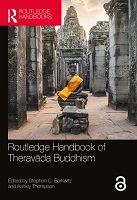Routledge Handbook of Theravāda Buddhism
Proposal review

Contributor(s)
Berkwitz, Stephen C. (editor)
Thompson, Ashley (editor)
Language
EnglishAbstract
Among one of the older sub-fields in Buddhist Studies, the study of Theravāda Buddhism is undergoing a revival by contemporary scholars who are revising long-held conventional views of the tradition while undertaking new approaches and engaging new subject matter. The term Theravāda has been refined, and research has expanded beyond the analysis of canonical texts to examine contemporary cultural forms, social movements linked with meditation practices, material culture, and vernacular language texts. The Routledge Handbook of Theravāda Buddhism illustrates the growth and new directions of scholarship in the study of Theravāda Buddhism and is structured in four parts: Ideas/Ideals, Practices/Persons, Texts/Teachings, Images/Imaginations. Owing largely to the continued vitality of Theravāda Buddhist communities in countries like Sri Lanka, Myanmar, Thailand, Cambodia, and Laos, as well as in diaspora communities across the globe, traditions associated with what is commonly (and fairly recently) called Theravāda attract considerable attention from scholars and practitioners around the world. An in-depth guide to the distinctive features of Theravāda, the Handbook will be an invaluable resource to provide structure and guidance for scholars and students of Asian Religion, Buddhism and in particular Theravāda Buddhism.
